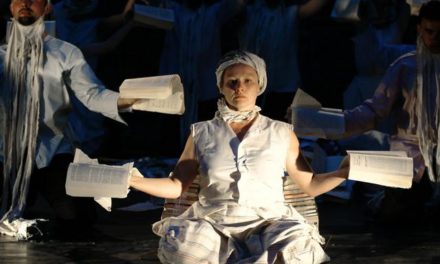This week, In the Depths of Dead Love opened at The Print Room in London. The play, by Howard Barker, is set in Ancient China and tells the tale of a poet, Chin, who, having been cast out of the Emperor’s court, makes a living by renting out his bottomless well to unhappy people looking to end their lives.
The cast of this new production includes James Clyde as Chin, William Chubb as Lord Ghang, Jane Bertish as Mrs Hu and Stella Gonet as Lady Hasi. And therein lies the great, white problem. In a play, set in Ancient China, with a cast of Chinese characters, all of the roles are taken by white actors. The director and writer are also white.
Understandably, this has not gone down well. Tonight, the official press night of the show, protesters plan to stand outside the theatre to rail against the use of “yellowface,” the practice of casting non-Asian actors in Asian roles. The theatre, for its part, has been unapologetic, issuing a statement last month to say that, “No offense was intended and, as we explain below, none should be taken.” In other words, they “whitesplained” their decision.
“In the Depths of Dead Love is not a Chinese play and the characters are not Chinese. The production references a setting in Ancient China and the characters’ names are Chinese. These are literary allusions in Howard Barker’s fable and never intended to be taken literally. The allusions are intended to signify ‘not here, not now, not in any actual real ‘where’’ and the production, set, costumes and dialogue follow this cue of ‘no place.’”
As the theatre also points out, the play premiered on BBC Radio 3 in 2013, where the lead roles were taken by Richard E Grant and Francesca Annis. Presumably, the reason no-one picked up on it then was that it was a single broadcast on Radio 3 and no-one could see their faces, but that doesn’t make it right. Even if one accepts the theatre’s explanation of the play – though, really, if it’s set in ‘no place’, not Ancient China, why does the blurb on The Print Room’s website begin with the words, “Set in ancient China”? – their further justification demonstrates some worryingly ancient attitudes.
Even if one accepts the theatre’s explanation of the play – though, really, if it’s set in ‘no place’, not Ancient China, why does the blurb on The Print Room’s website begin with the words, “Set in ancient China”? – their further justification demonstrates some worryingly ancient attitudes.
“It is, in fact a very ‘English’ play and is derived from thoroughly English mores and simply references the mythic and the ancient. It has therefore been cast accordingly.”
Ah, I see, English roles for English people because all English people are white. What a bone-headed thing to write in 2017, when the British theatre has a large pool of East Asian talent to draw on. Just look at the cast of the brilliant, 2013 smash-hit Chimerica. As Harry Potter actress Katie Leung put it “We are here. We exist.”
And what an appalling thing to write in 2017 when theatre’s arguably most hideously white man, Andrew Lloyd Webber, feels moved to describe British theatre as “hideously white,” and when diversity and roles for BAME artists, on and off stage, is the most urgent priority for most arts institutions. The Print Room has shown itself to be utterly out of step with the times, a theatre for the dark ages. Or as they might prefer to put it, a theatre “not here, not now, not in any actual real ‘where’.” The sooner the curtain comes down on this sorry episode, the better.
This article first appeared at Inews.co.uk. Reposted with permission. Read an original article here.
This post was written by the author in their personal capacity.The opinions expressed in this article are the author’s own and do not reflect the view of The Theatre Times, their staff or collaborators.
This post was written by Alice Jones.
The views expressed here belong to the author and do not necessarily reflect our views and opinions.


















